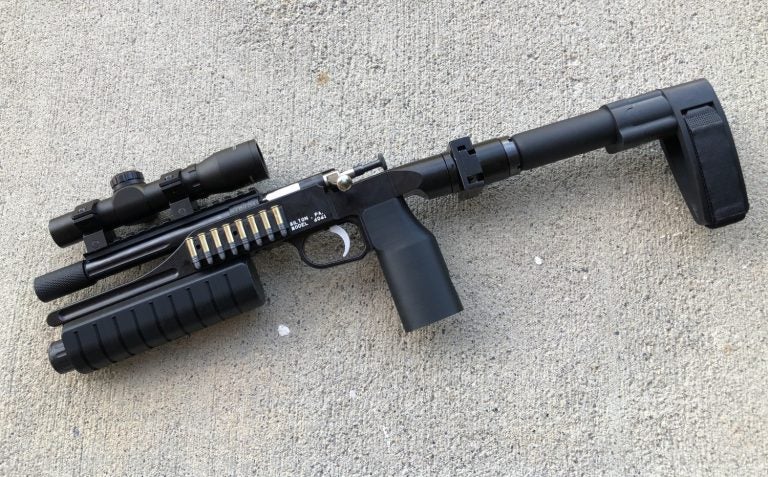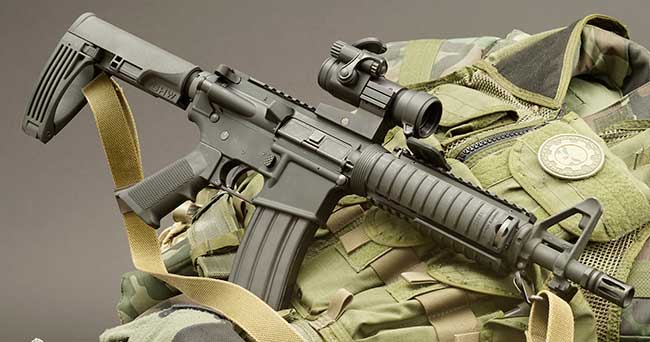As if 2020 couldn’t get any more tumultuous, the ATF seems like it has taken a particular interest in stirring up the pot for firearms owners in these later months by sneaking further restrictive measures into current firearms laws. A recent interpretive change within the ATF could reclassify pistols and rifles based merely on the inclusion of rifle sights and the use of 5.56 caliber ammunition. Our source is Wiley.law which provides insight into various federal and state law changes.

Pistol or Rifle? ATF Sneaking in More Arbitrary Firearms Regulations?
Pistol or Rifle? ATF Sneaking in More Arbitrary Firearms Regulations?
Many of you will know that the importation of firearms is subjected to the National Firearms Act and basically limits imports to firearms that meet the “sporting purposes” guideline. Over the last 50 years, the ATF has issued a study after study that evaluates the criteria which define firearms as “sporting” under the law.
Some of the legislation, like those related to handguns, is more or less straightforward and it requires to earn 75 “points” which is simply a numeric value that the ATF uses to determine if the pistol (or 45 points for revolvers) meets the sporting import requirements. Certain things like frame construction, caliber, safety features, and other items like external hammers and adjustable sights will add points to the overall score. (For an example, see ATF form 4590).

Pistol or Rifle? ATF Sneaking in More Arbitrary Firearms Regulations?
However, when it comes to rifles, there is no current ATF procedure or test for a firearm that fails to fit the definition of a handgun, rifle, or shotgun. Thusly the ATF has always determined that these firearms are not importable. Up until recently, the ATF had remained largely silent in regards to the length and weight of handguns in regards to determining “sporting” status. Recent classification letters issued within the last couple of months, however, indicate that they have shifted their position to reinterpret what constitutes a handgun by saying that if a submitted firearm is “too long” or “too heavy” then it fails to meet the definition of a handgun under The Gun Control Act as it is “not designed to be held and fired by the use of a single hand.”

Pistol or Rifle? ATF Sneaking in More Arbitrary Firearms Regulations?
This subjective approach to interpretation is leading to increasingly inconsistent determinations that threaten both existing and future firearms. For example, there is an HK91 pistol submission that is less than 8 pounds with an 8-3/4″ barrel and an overall length of 21-3/4 inches – sounds like a pistol under the currently established definition we’re all familiar with. However, this particular firearm submission was deemed “not a handgun” by the Firearms and Ammunition Technology Division (FATD) of the ATF. Wiley goes on to list a few “objective design features” the ATF has been using in its new letters to determine if a firearm falls within the handgun category”
- Incorporation of rifle sights;
- Utilization of “rifle caliber ammunition” (both 5.56mm and 7.62mm have been considered as such);
- Incorporation of “rifle-length barrel;”1
- The “weapon’s heavy weight;”
- Ability to accept magazines that range in capacity from 20 rounds to 100 rounds, “which will contribute to the overall weight of the firearm”; and
- The overall length of the weapon which “creates a front-heavy imbalance when held in one hand.”

Pistol or Rifle? ATF Sneaking in More Arbitrary Firearms Regulations?
A number of disturbing considerations have to be noted from the above list. First, what exactly constitutes a “rifle length barrel” in their eyes? Secondly what exactly is “rifle caliber ammunition.” Unless I am mistaken, the ATF currently makes no differentiation between rifle and handgun ammunition. Either way, it seems that despite the complaints of the firearms community at large, no solid definitions are being given and no headway is being made in regards to clarifying these arbitrary firearms determinations.
 Your Privacy Choices
Your Privacy Choices
